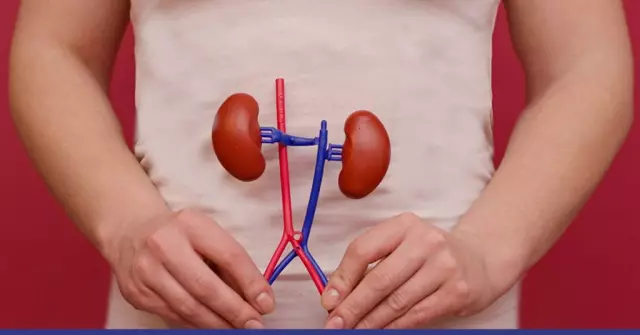- Author Rachel Wainwright wainwright@abchealthonline.com.
- Public 2023-12-15 07:39.
- Last modified 2025-11-02 20:14.
Vomiting

The expulsion of stomach contents through the mouth is called vomiting. As a rule, vomiting is preceded by nausea - discomfort in the esophagus and stomach.
Vomiting: causes, diagnosis, help
Vomiting is often caused by the ingestion of substances harmful to humans - spoiled food, poisons, etc. It is an effective way to eliminate toxins through the digestive tract. A special vomiting center located in the brain is responsible for the appearance of vomiting.
Often the cause of vomiting can be the so-called motion sickness. During pregnancy, vomiting is one of the symptoms of toxicosis. It can also be a side effect of taking certain medications.
Many diseases of the gastrointestinal tract - gastritis, gastroduodenitis, enteritis and others, are also accompanied by vomiting. Often, vomiting is of psychogenic origin.
In order to understand the nature of the origin of vomiting, a detailed patient survey is required. Additionally, blood and urine tests, as well as an x-ray, ultrasound, or esophagogastroduodenoscopy may be required.
Some emergencies can also be accompanied by vomiting. If vomiting is profuse and indomitable, sometimes with blood inclusions, its causes are incomprehensible or are the result of head or abdominal trauma, the patient's condition continues to deteriorate, then emergency medical attention is needed. An especially urgent visit to a specialist is required when a child vomits.
Attention - threat: vomiting and fever in a child
The danger of vomiting in a child is the rapid dehydration of the child's body and the loss of electrolytes by it, which can be fatal. In childhood, vomiting can occur against the background of gastrointestinal infections, diseases of the nervous system, due to emotional overstrain, as well as with various pathologies requiring surgical intervention. At the same time, parents should be able to distinguish vomiting from banal regurgitation due to air entering the gastrointestinal tract.
A child of any age, especially a younger or an infant, with profuse recurrent vomiting, must be immediately shown to a specialist. As pre-medical methods, constant monitoring of the child's condition is necessary, ensuring the position of the body, excluding the ingress of vomit into the respiratory tract, toilet in the oral cavity, and drinking salt.
Anxious couple - vomiting and diarrhea
Vomiting and diarrhea are integral symptoms of a variety of digestive disorders of various etiologies. In fact, they are a protective reaction of the body, a kind of attempt to cleanse itself of harmful substances.

Vomiting and diarrhea can be caused by poor quality food. Along with fever and abdominal pain, they can signal the onset of an infectious disease.
If vomiting and diarrhea are not debilitating, during the first day you need to drink plenty of fluids. It is better to use alkaline mineral water or pharmacy saline solutions. If necessary, you can prepare an electrolyte drink yourself by adding one teaspoon of salt and sugar to a glass of pure boiled water. It is worth giving the body the opportunity to independently get rid of toxic substances.
A mild antiseptic is a weak solution of potassium permanganate. It is also advisable to take sorbents, for example, activated carbon. A glass of water with a teaspoon of starch is an excellent remedy for diarrhea.
If these measures do not bring relief within a day or two, vomiting and fever persist, a specialist consultation is necessary.
Specific symptom: vomiting of bile
With such diseases of the gastrointestinal tract as gastric ulcer, chronic cholecystitis or pancreatitis, vomiting of bile may occur. Its appearance indicates the throwing of the contents of the gallbladder into the esophagus. Reception of fatty and fried foods can provoke the appearance of vomiting of bile against the background of remission of the underlying disease as a result of its hypersecretion and disruption of the normal functioning of the gatekeeper.
For the purpose of diagnosis, fibrogastroscopy and measurement of gastric acidity are used. For therapy, anti-inflammatory drugs, prokinetics (motilium, etc.) are used to normalize the functions of the pylorus and stomach, antispasmodics and antibiotics.
To reduce the acidity of gastric juice, drugs from the group of hydrogen pump inhibitors (Almagel and others) are used. To achieve a quick effect, ursodeoxycholic acid preparations are included in the course of treatment, which decompose excess fatty acids.
YouTube video related to the article:
The information is generalized and provided for informational purposes only. At the first sign of illness, see your doctor. Self-medication is hazardous to health!






